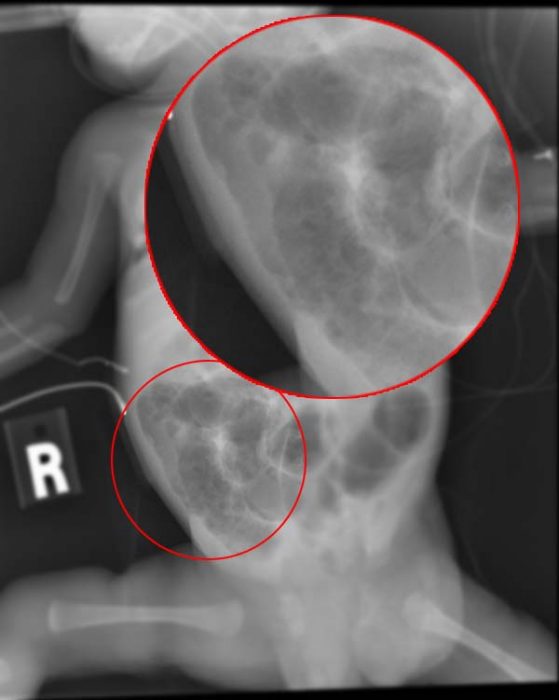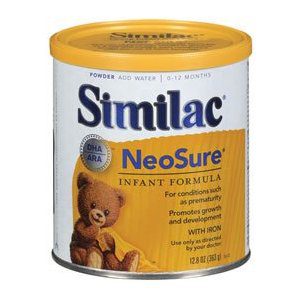Necrotizing enterocolitis, also known as NEC, is a deadly condition that affects preterm newborns’ intestines. Research has shown a correlation between NEC and baby formula in premature infants and an increased risk of developing necrotizing enterocolitis. A developed sickness often occurs in babies who are given baby formula rather than breast milk within the first two weeks of life.

In this situation, the intestine’s wall is invaded by bacteria. As a result, it starts to swell up. This may result in a split or opening that permits pathogenic microorganisms to enter the abdomen. It can cause severe illness and even death if left untreated.
NEC
What Are The Risk Factors Associated?
Doctors are uncertain of what causes Necrotizing Enterocolitis. However, they know that preterm infants have less developed lungs and intestines compared to full-term babies. This indicates that the bodies of premature infants don’t circulate blood and extra oxygen as they should. Additionally, premature infants struggle with infection control and food digestion.
Necrotizing Enterocolitis happens mostly in premature infants due to the immaturity of their digestive system. That’s the reason why enteral feedings infants with human milk or breast milk is important, especially for premature babies. Human milk or breast milk contains all the absorb nutrients your infant needs, without you worrying about possible side effects.
Premature babies, especially those in the neonatal intensive care unit, often require specialized nutrition. While human breast milk is the gold standard, it’s not always available or sufficient for these tiny fighters. That’s where infant milk and human milk fortifier come into play. These products, including those from Mead Johnson, are designed to meet the unique nutritional needs of premature babies.
Fortunately, Necrotizing enterocolitis is rare. Only one in every 2,000 to 4,000 births is impacted. While it can occur in any newborn infant, premature babies weighing less than 3.25 lbs are more likely to experience it. Premature babies have immature digestive which explains why premature babies have a higher chance of getting Necrotizing Enterocolitis. Those who may also be in danger are:
- High-risk or preterm infants who are tube- or mouth-fed infant milk
- Babies whose oxygen levels are low or who had a difficult delivery
- Babies with an excess of red blood cells in their system. Blood tests are good to check the components of the blood. Blood tests are also used to see other complications in the body.
- Babies who already have stomach illnesses
- Babies in critical condition and those who have had blood transfusions
What Are The Symptoms Of NEC?
From child to child, NEC symptoms can vary. But in the first two weeks of life, an infant with NEC will typically develop the following:
- NEC babies are bloated or swollen abdomens.
- NEC babies have meals that do not pass through the intestines and remain in the stomach.
- NEC babies have green stomach fluid.
- NEC babies have bloody feces.
- NEC babies have low heart rates, difficulty breathing, and sluggishness.

Other medical diseases or digestive issues can cause similar signs and symptoms to NEC. Call your doctor if your child exhibits any of the symptoms mentioned above.
Your child’s doctor will perform a blood test and an abdominal X-ray, typically in the neonatal critical care unit, or much known as the neonatal intensive care unit. When a little one is put into the neonatal intensive care unit, it means they need intensive medical care. The X-ray will reveal gas or air bubbles in the intestinal wall if it is NEC.
Additionally, the doctor might put a needle into your child’s abdomen. There may be a hole in their intestines if fluid comes out. Low white blood cells are detected in newborns with Necrotizing Enterocolitis through blood tests. That implies that your baby’s resistance to infection is diminished.
What Are The NEC Baby Formula Lawsuits?
Are you aware of the NEC infant milk lawsuit? The parents of preterm infants or premature infants are suing Similac and Enfamil manufacturers. NEC Baby formula lawsuits allege that the makers of these potentially deadly cow’s milk-based formulae failed to provide proper warnings that they could cause major gastrointestinal issues in premature newborns and even death.
When manufacturers fail to provide proper information when it comes to the harmful effects of their product, you can’t stop consumers from filing infant formula lawsuits. But filing lawsuits isn’t the initial solution in every problem. If you’re a parent and are curious to know whether to file a legal claim or not, you may try a free case evaluation.
The incidence of NEC is also influenced by factors like the baby’s intestinal microbiota, which can be affected by their diet. Liquid protein supplements, such as human milk fortifier powder, can help, but they’re not a replacement for breast milk.
Parents of babies born prematurely should be warned about these risks. The potential medical bills from treating NEC far outweigh the cost of sourcing human milk or suitable alternatives. Ultimately, the goal is to protect the health of these vulnerable infants and give them the best start in life.
Parents have sued Mead Johnson, the manufacturer of Similac, and Abbott Laboratories, the manufacturer of Enfamil, claiming that these corporations knew or should have known that their infant formula products could result in necrotizing enterocolitis (NEC) in premature newborns. However, Mead Johnson, or rather the baby formula manufacturers, did not disclose the risk to parents or medical professionals.
NEC or Necrotizing Enterocolitis is a severe digestive disorder that destroys intestinal tissue and can be fatal in up to 50% of patients. It leads to intestinal inflammation, which could result in gut perforations. In addition, bacteria from the intestine can escape into the blood or abdomen and cause fatal blood infections or other severe illnesses.
Observational research published in Neonatology found that premature newborns who were exclusively given human milk or breast milk had a considerably lower risk of getting NEC than those who were solely fed formula. Another study indicated that breastfed babies had fewer risks than those provided with mother’s milk and infant milk. This study was published in The Journal of Pediatrics.
What Brands Are Included In NEC Baby Formula Lawsuits?
Here are some of the brands included in the infant formula lawsuit for resulting with a develop NEC. Brands of infant formula implicated in the cases against Similac and Enfamil include Similac Human Milk Fortifier, Similac Alimentum Expert Care, Similac Special Care, Similac Human Milk Fortifier Powder, Similac Alimentum, Similac NeoSure, Similac Human Milk Fortifier Concentrated Liquid, Similac Special Care 20, Similac Special Care 24 High Protein, Similac Special Care 24, Similac Liquid Protein Fortifier, Similac Human Milk Fortifier Hydrolyzed Protein- Concentrated Liquid, and Similac Special Care 30.
The Similac Human Milk Fortifier formulas, as well Human Milk Fortifier from Enfamil are the ones who got included in the lawsuit. A human milk fortifier is originally intended for premature and low-birth-weight infants. A human milk fortifier is supposed to serve as a nutritional supplement to be added to milk but these companies failed to warn their consumers of the potentially toxic cow’s milk based products formulas of theirs.

Meanwhile, Enfamil brands included: Human Milk Fortifier Acidified Liquid, Enfacare Powder, Enfamil Human Milk Fortifier Powder, Enfamil 24 and DHA & ARA Supplement, Enfamil Premature 30 Cal, Enfamil Premature 20 Cal, Enfamil Human Milk Fortifier Liquid High Protein, Enfamil Premature 24 Cal, Enfamil NeuroPro Enfacare, Enfamil Milk Fortifier Liquid Standard Protein, and Enfamil Premature 24 Cal/fl oz HP.
Parents who filed a Similac lawsuit or an Enfamil lawsuit claim that neither Enfamil nor Similac contains any warnings concerning Necrotizing Enterocolitis as a side effect of infant milk, as well as any appropriate directions or guidelines for their use. Despite the possible risks with a develop NEC, the businesses promoted their products as applicable and safe for premature infants.
However, not all baby formulas are created equal. Some are cow’s milk-based, and while they can be beneficial, they also carry an increased risk of developing NEC, a serious disease that can lead to infant death. This risk is particularly high if the infant milk products are introduced within the first two weeks of life, instead of being fed breast milk.
Parents are suing for substantial financial losses and emotional suffering due to the harm or death of their infant after they fed Enfamil.
Are Enfamil And Similac Baby Formulas Recalled?
Because of the association between baby milk and Necrotizing Enterocolitis (NEC), Enfamil and Similac have not been recalled. However, there have been sporadic retail recalls due to product tampering, and a recall for a possible bacterial illness was issued in February 2022.
A few moms complained that their Enfamil products included flour instead of infant formula, which led to the discovery of tampering. Another event involved newborns who apparently consumed Enfamil, which is said to trigger bacterial infections, and some of them became sick and died. However, the milk passed FDA testing, and it was deemed safe.
Several Similac, EleCare, and Alimentum infant formulas produced at Abbott Nutrition’s Sturgis, Michigan, facility were recalled in February 2022 after four babies contracted Cronobacter sakazakii illnesses and one baby contracted Salmonella Newport. Two of the infants passed away.
According to a preliminary FDA inspection report published in March 2022, Abbott was found to lack “a system of process controls” to “ensure that infant milk does not become adulterated due to the presence of microorganisms.”
The FDA received a second report of a baby fatality in June 2022 that a bacterial infection might have caused. Abbott’s Sturgis plant reopened the same month to deal with the infant milk shortage in part by the recall.
Bookmark Family Hype for more health updates for you and your baby’s safety.
NEC And Infant Formulas FAQs
Can Milk Cause NEC?
NEC or Necrotizing Enterocolitis happens when an infant is fed an infant milk containing cow’s milk. Infants should be fed with human milk or breast milk instead of infant formulas because these offer the best nutrients a baby need. Necrotizing Enterocolitis is caused by bacteria from infant formulas with cow’s milk–which are used in infant formulas.
What Are The Symptoms Of NEC From Milk?
Why Does Formula Increase The Risk Of NEC?
Can Overfeeding Cause NEC?
How Quickly Does NEC Develop?
How Do You Know If Your Baby Has Necrotizing Enterocolitis?
Which Milk Is Linked With NEC And Baby Formula?
Did you know that premature infants fed cow’s milk-based formulas are at a higher risk of developing NEC (Necrotizing Enterocolitis)? This dangerous condition, which affects the intestinal tract and abdominal cavity, is a serious concern for parents. Fortunately, options like the Human Milk Banking Association offer exclusive human milk diets, reducing the risk of surgical NEC. Children’s Hospital Los Angeles recommends avoiding bovine milk based products, especially for vulnerable premature infants, as they may lead to severe cases of NEC, characterized by symptoms like bloody stools. Ensuring infants are not fed cow’s milk-based products is crucial for preventing dangerous bacteria from breaching the gut wall barrier and causing NEC, which can sometimes require surgically treated nec treatment.
How Can I Lower My NEC Risk?
Lowering the risk of Necrotizing Enterocolitis (NEC) in infants is crucial, particularly for those with low birth weights. Human milk, produced by the infant’s mother, is the optimal choice over fed cow’s milk based formulas, as studies link NEC with cow’s milk consumption. Enteral nutrition products derived from human milk are specifically tailored to suit the delicate balance of a baby’s intestines, reducing the likelihood of feeding intolerance and NEC occurs. Furthermore, human milk provides essential nutrients and antibodies that protect against harmful bacteria, potentially averting the need for broad spectrum antibiotics and mitigating long term health complications and associated health care costs.
If you can’t produce breast milk, you can try having a human donor milk. Having a pasteurized donor human milk is a way to give milk to your baby if you’re not available. Of course, there are some risks to getting human donor milk for your baby. Be sure to check with your pediatrician first. Talking to your pediatrician has always been the most infants recommended thing to do instead of giving out formulas with cow’s milk that can be harmful to your child.
Can NEC Go Away On Its Own By Breast Milk?
Can NEC Cause Autism On Premature Babies or Premature Infants?
Is Enfamil Or Similac Linked To NEC?
Is Similac Safer Than Enfamil?
What Brands Are NEC Milk Infant Formula?
What Is The Alternative For Similac?
What Is The Healthiest Infant Milk Brand?
Last Updated on April 12, 2023 by Shulammite Jan Languido
DISCLAIMER (IMPORTANT): This information (including all text, images, audio, or other formats on FamilyHype.com) is not intended to be a substitute for informed professional advice, diagnosis, endorsement or treatment. You should not take any action or avoid taking action without consulting a qualified professional. Always seek the advice of your physician or other qualified health provider with any questions about medical conditions. Do not disregard professional medical advice or delay seeking advice or treatment because of something you have read here a FamilyHype.com.